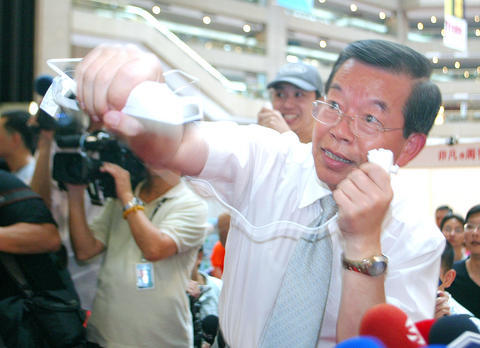Democratic Progressive Party (DPP) presidential candidate Frank Hsieh (
Hsieh made the remarks after the Special Investigation Section (SIS) under the Supreme Court Prosecutors' Office told reporters yesterday that he was a defendant in the Yu Huang Temple (
The Yu Huang Temple bribery allegations first came to light in 2002 when Hsieh was Kaohsiung mayor.

PHOTO: CNA
Hsieh was accused of accepting NT$2.8 million (US$84,848) from Hsu Wen-liang (
The Chinese-language United Daily News yesterday reported that the SIS had reopened the investigation and decided to list Hsieh as a defendant "because prosecutors had discovered a lot of new evidence, which may impact on Hsieh's presidential campaign."
Rebutting the report, SIS spokesman Chen Yun-nan (陳雲南) told the press that "[Hsieh] has been a defendant in this case since the start, when the case was still in the hands of Kaohsiung prosecutors."
He added that "what you read in the newspapers may not necessarily be accurate."
Chen said that what prosecutors are working on had nothing to do with Hsieh's presidential campaign activities.
"We will do what we are supposed to do. Whether or not this will impact on his [Hsieh's] presidential campaign is not our concern," Chen said.
DPP Legislator Hsu Kuo-yung (
In his defense, Hsieh told the media yesterday that his support group had received the donation from the temple in Kaohsiung's Samin District, in 2003 but later returned the money to the temple because it feared the donation might be "controversial."
The temple later insisted on giving the money back to his support group, Hsieh said, so he decided to spend the money on buying two ambulances -- Yu Huang 1 and Yu Huang 2, which remain in use in Kaohsiung.
"It is my understanding that former Chinese Nationalist Party [KMT] chairman Lien Chan (
He added that "unlike me, they did not attempt to return the money."
"This is an old case. If I were guilty, I would have been put away behind bars already," Hsieh said. "Trust me. I will be fine."
Additional reporting by Flora Wang

NATIONAL SECURITY THREAT: An official said that Guan Guan’s comments had gone beyond the threshold of free speech, as she advocated for the destruction of the ROC China-born media influencer Guan Guan’s (關關) residency permit has been revoked for repeatedly posting pro-China content that threatens national security, the National Immigration Agency said yesterday. Guan Guan has said many controversial things in her videos posted to Douyin (抖音), including “the red flag will soon be painted all over Taiwan” and “Taiwan is an inseparable part of China,” while expressing hope for expedited “reunification.” The agency received multiple reports alleging that Guan Guan had advocated for armed reunification last year. After investigating, the agency last month issued a notice requiring her to appear and account for her actions. Guan Guan appeared as required,

A strong cold air mass is expected to arrive tonight, bringing a change in weather and a drop in temperature, the Central Weather Administration (CWA) said. The coldest time would be early on Thursday morning, with temperatures in some areas dipping as low as 8°C, it said. Daytime highs yesterday were 22°C to 24°C in northern and eastern Taiwan, and about 25°C to 28°C in the central and southern regions, it said. However, nighttime lows would dip to about 15°C to 16°C in central and northern Taiwan as well as the northeast, and 17°C to 19°C elsewhere, it said. Tropical Storm Nokaen, currently

PAPERS, PLEASE: The gang exploited the high value of the passports, selling them at inflated prices to Chinese buyers, who would treat them as ‘invisibility cloaks’ The Yilan District Court has handed four members of a syndicate prison terms ranging from one year and two months to two years and two months for their involvement in a scheme to purchase Taiwanese passports and resell them abroad at a massive markup. A Chinese human smuggling syndicate purchased Taiwanese passports through local criminal networks, exploiting the passports’ visa-free travel privileges to turn a profit of more than 20 times the original price, the court said. Such criminal organizations enable people to impersonate Taiwanese when entering and exiting Taiwan and other countries, undermining social order and the credibility of the nation’s

‘SALAMI-SLICING’: Beijing’s ‘gray zone’ tactics around the Pratas Islands have been slowly intensifying, with the PLA testing Taiwan’s responses and limits, an expert said The Ministry of National Defense yesterday condemned an intrusion by a Chinese drone into the airspace of the Pratas Islands (Dongsha Islands, 東沙群島) as a serious disruption of regional peace. The ministry said it detected the Chinese surveillance and reconnaissance drone entering the southwestern parts of Taiwan’s air defense identification zone early yesterday, and it approached the Pratas Islands at 5:41am. The ministry said it immediately notified the garrison stationed in the area to enhance aerial surveillance and alert levels, and the drone was detected in the islands’ territorial airspace at 5:44am, maintaining an altitude outside the effective range of air-defense weaponry. Following